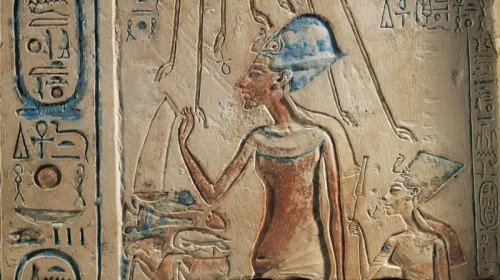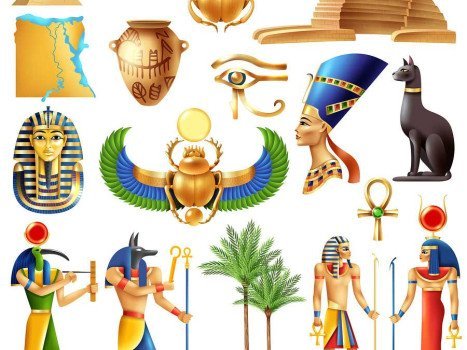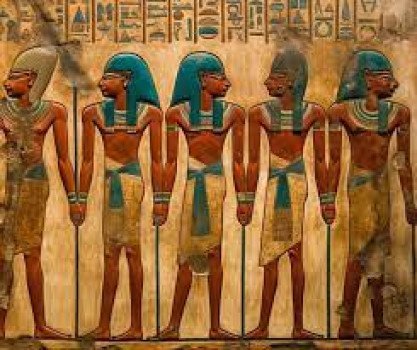Did the ancient Egyptians believe in "One and Only God" before the Abrahamic religions?
The One and Only God is an idea the ancient Egyptians went for in their religious texts and philosophies. As in the hymns of Akhenaten they praised the creator who made the world according to his will, who made humans, big and small cattle, and all that walk and fly. Here is an excerpt from Akhenaten’s hymns, one of the many religious texts left by the ancient Egyptians, showing the intellectual and linguistic content of their religious philosophy, full of cultural, historical human and spiritual depth before the Abrahamic religions
The ancient Egyptian religion is still a puzzle for historians of ancient Egypt. The philosophical vision mixed with mythological elements evolved over centuries of historical and political changes. This complexity gave depth to their religious thought.
The Egyptian belief in a supreme divine force was the foundation of their religious thought, and they clearly expressed the idea of "One God". This is evident in the wisdom literature: "It is not the will of man that prevails, but the will of God" (Teachings of Ptahhotep), "Whoever acts thus, God will praise his name" (Teachings of Ani), "Man is clay and straw, and his maker is God" (Teachings of Amenemope), "I made God happy because I did what was right" (Teachings from the Middle Kingdom).
This led French scholar Robert-Jacques Thibaud to write in his book "Dictionary of Egyptian Myths and Symbols" that the Egyptians did not worship a pantheon of gods but one God, the creator of the earth. This God, compared to a potter who made his creation from clay and Nile water, was the subject of religious rituals and myths for over three thousand years.
The Egyptian religious beliefs shaped their view of life, death and the afterlife. They wondered about the universe, the creation of humans, and the origin of life on earth, they were the first to believe in resurrection and eternal life in the ancient Near East.
The Egyptians’ observation of natural phenomena like the Nile’s flood and rainfall, lightning and plant growth led them to acknowledge an invisible, all powerful force that governs their environment and the universe. They found ways to communicate with this force, they gave meaning to various natural phenomena and creatures. They worshiped the sun and the sky for their kindness and appeased the destructive forces like lightning to avoid harm.
So they revered animals that symbolized goodness like cows and viewed others like snakes and scorpions with caution. This reverence for nature and its creatures was the foundation of the religious doctrine that spanned Egypt’s historical periods.
Did they worship the animals and birds or did they symbolize the divine forces beyond their understanding in the early stages of their culture?
Egyptologist Abdel Halim Nour El-Din says Egyptians didn’t worship animals and birds for themselves but as earthly symbols of these unseen forces. He says despite their sacred status they slaughtered cows and killed crocodiles and snakes, so they were worshipping the divine power these creatures represented.
As their thought evolved they created a “specific god” for each phenomenon. These gods whose names varied from region to region represented aspects of the supreme god. The belief in the afterlife alongside their reverence and fear of natural forces led to a multitude of gods.
Rendell Clark in his book “Symbol and Myth in Ancient Egypt” says the Egyptians didn’t have a word for religion they saw it as part of life itself. Temples were centers of life force, no separation between religion and state, the king was also the chief priest.
French scholar Pierre Montet in “Everyday Life in Egypt in the Time of Ramesses” says temples were built with the best materials so they would be the most beautiful and durable of all structures, that’s how much the Egyptians loved their gods and the afterlife.
French scholar François Daumas in “Pharaonic Civilization” says the term “nTr” (netjer) means the god and its manifestations, the supreme divine force. He says for the commoners the gods were personal entities or forces subject to a higher power, embodying the attributes of the supreme hidden force.
Egyptologist Ramadan Abdou Ali in his book “Ancient Egyptian Civilization” says there are three meanings of the word “nTr”: it means the absolute god, the creator god and the sacredness attributed to certain kings, individuals, symbols and places. This term means the reverence for the divine that was both awesome and omnipresent in ancient Egyptian thinking.
In short the ancient Egyptians’ religious beliefs and texts are a deep and multifaceted understanding of the divine, of “The One and Only God”.
 English
English
 Español
Español
 Chinese
Chinese
 français
français
 português
português
 Italian
Italian
 Russian
Russian
 Czech
Czech
 Deutsch
Deutsch
 Japanese
Japanese









